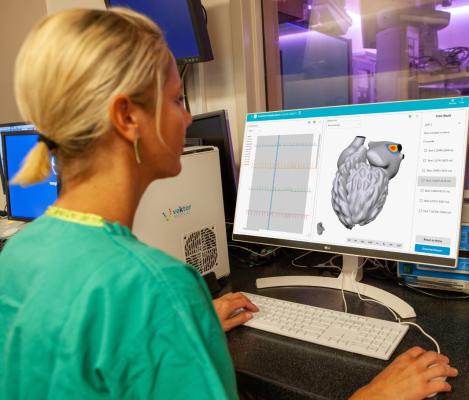
Vektor Medical has announced that use of its vMap arrhythmia mapping system during complex atrial fibrillation (AF) ablation was associated with significantly improved freedom from atrial arrhythmias compared with standard-of-care pulmonary vein isolation. Photo courtesy: Vektor Medical
March 30, 2023 —Vektor Medical has announced that use of its vMap arrhythmia mapping system during complex atrial fibrillation (AF) ablation was associated with significantly improved freedom from atrial arrhythmias compared with standard-of-care pulmonary vein isolation. The results were presented on March 25 during the Biomarkers and Personalized Medicine in Cardiovascular Disease Symposium. The San Diego, CA-based company reported that targeted, driver-site ablation in conjunction with pulmonary vein isolation (PVI) achieves 87.5% freedom from atrial fibrillation (AF) and atrial tachycardia (AT) in complex AF patients versus 58.0% for PVI-only control.
“Using vMap, we were able to efficiently identify AF source locations and then successfully ablate target sites, resulting in a significantly higher success rate than in the control group,” stated David Krummen, Professor of Clinical Medicine at University of California San Diego, co-founder and inventor for Vektor Medical. “Traditionally, ablation success rates for the complex AF patients included in this study have been disappointing, and mechanistic insights which may guide ablation to atrial fibrillation-sustaining sites are desperately needed. While additional studies will be needed to validate the findings in a larger population, the high rate of arrhythmia-free survival seen in the study arm at six months is extremely encouraging,” added Krummen. The company reports it develops the world’s only technology to rapidly map arrhythmias using just 12-lead ECG data.
In a novel feasibility study, patients who received targeted AF-driver ablation, guided by the vMap arrhythmia mapping system, as well as PVI had significantly higher rates of freedom from AF and AT than the control patients undergoing pulmonary vein isolation alone at a median follow-up of six months. The findings add to the growing body of evidence that demonstrates vMap’s exciting potential to improve treatment of atrial fibrillation and a range of other arrhythmias. For the study, complex atrial fibrillation ablation was defined as patients with persistent AF, recurrent AF after prior ablation, and atrial fibrillation associated with a second atrial arrhythmia.
The study included a treatment arm of 15 AF patients who received successful PVI and AF driver site ablation guided by vMap. The control arm consisted of 54 persistent and paroxysmal AF patients who had successful PVI. The study found that additional AF driver site ablation guided by the vMap system was associated with an 87.5% freedom from all atrial arrhythmias compared with the control arm’s 58.0% arrhythmia-free survival (p=0.043). Additional multicenter studies are planned to further validate the study results.
“I absolutely believe that treatment for AF is not one size fits all and these results are another reminder that we, as electrophysiologists, can continue to do better in our treatment plan for atrial fibrillation,” said Dr. Alborz Hassankhani, MD, PhD, an electrophysiologist not associated with the study. “While for many the standard of care may be pulmonary vein isolation, these results suggest that targeted driver-site ablation may help deliver the superior results our patients deserve. The fact that we see so many recurrences following ablation tells me that there is something fundamental missing in our approach to this disease. vMap seems to provide a guide to a more individualized approach. The results speak for themselves.”
Vektor Medical reports that vMap is a next-generation, FDA-cleared technology that enables rapid and non-invasive mapping of arrhythmia sources for focal or fibrillation-type arrhythmias in all four chambers of the heart, with 97.3% accuracy. According to a company statement detailing results of the feasibility study, vMap utilizes advanced machine learning techniques and proprietary computational models to extract valuable information from a standard 12-lead ECG, providing functional insights into the location of arrhythmia sources. The goal of vMap is to improve medicine by optimizing our understanding of arrhythmias and improving ablations by accurately identifying the sources of those arrhythmias.
The statement noted that the company focuses on enhancing the success rate of first-pass ablation, to reduce the risks associated with invasive mapping, and shorten procedure times, resulting in better outcomes for patients and a decrease in healthcare costs related to ablation procedures.
More information: www.vektor.com
Related content:
VEKTOR MEDICAL TO PRESENT POSITIVE RESULTS FROM VMAP CLINICAL VALIDATION STUDY


 January 05, 2026
January 05, 2026 









